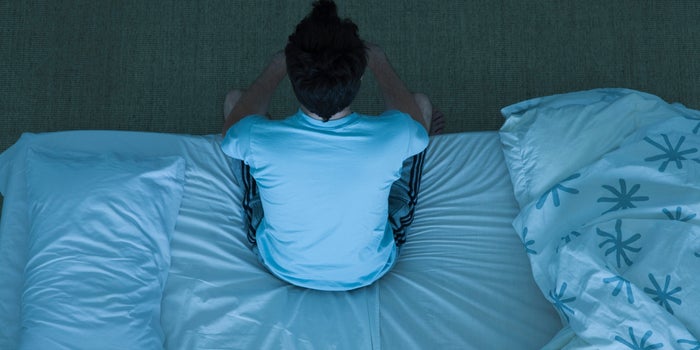Can CBD Combat Sleep Disorders?

It’s not surprising that people have started to turn to CBD for sleep. That’s because, after decades of hearing advice on how to sleep well, changing diets to improve sleep, and using innovative tech to help people track sleep, people still have a big problem falling asleep when the lights go out.
How big is the problem? The Centers for Disease Control and Prevention estimates that one in three adults in the U.S. does not get enough sleep. And that number came before the coronavirus pandemic and the seemingly endless stream of upsetting news events and natural disasters in recent years.
If you wonder whether you are part of that 33 percent of the population, the recommended amount of sleep for those between the ages of 18-60 is at least seven hours each night. What’s more, routinely sleeping less than seven hours is associated with a higher risk for obesity, diabetes, high blood pressure, heart disease, stroke, and frequent mental distress.
Sleep’s a big deal. Cannabis seems promising in dealing with many different health issues. Is CBD for sleep one of them?
Research is woefully lacking on cannabis, but one study looked at CBD for sleep.
Because the federal government still lists cannabis as a Schedule I illegal drug, on par with cocaine and heroin, cannabis research has been lacking. While some changes might be on the horizon, U.S. researchers have for decades been forced to use substandard marijuana for research.
However, a group of researchers from Colorado published study results in 2019 that showed CBD positively impacted those who lost sleep due to anxiety. Of those involved in the study, 79.2 percent saw anxiety levels fall within the first month of using CBD for sleep. Also, 66.7 percent experienced an improvement in their sleep in the first month, although this number fluctuated over the ensuing months.
In a summation on the potential health benefits of CBD, the Harvard Medical Review wrote that CBD “is commonly used to address anxiety, and for patients who suffer through the misery of insomnia, studies suggest that CBD may help with both falling asleep and staying asleep.”
CBD may impact cortisol levels
One theory about CBD is that it lowers the levels of cortisol. Known as the stress hormone, cortisol levels tend to peak in the morning. However, those with stress and anxiety may experience higher cortisol levels around bedtime, making sleep harder for them.
Older studies on CBD have raised this issue. For example, one found that taking 300 or 600 mg of CBD oil lowered cortisol levels in study participants, meaning it may act as a kind of sedative. Another study found that when compared to a placebo, those who took CBD had a longer duration of sleep.
The bottom line is that CBD for sleep shows potential, but more study is needed. The Colorado study indicates that at least for short periods, CBD may induce better sleep. But the study also advises that more extensive research is needed.
It’s also wise to take into account the CDC advice for sleep that revolves around lifestyle changes. They include going to bed at the same time every night and getting up at the same time every morning. They also recommend turning off televisions, computers, and mobile devices in the bedroom - no “just scrolling for a few minutes” before sleep. Those minutes too often turn into an hour or more.
420 Intel is Your Source for Marijuana News
420 Intel Canada is your leading news source for the Canadian cannabis industry. Get the latest updates on Canadian cannabis stocks and developments on how Canada continues to be a major player in the worldwide recreational and medical cannabis industry.
420 Intel Canada is the Canadian Industry news outlet that will keep you updated on how these Canadian developments in recreational and medical marijuana will impact the country and the world. Our commitment is to bring you the most important cannabis news stories from across Canada every day of the week.
Marijuana industry news is a constant endeavor with new developments each day. For marijuana news across the True North, 420 Intel Canada promises to bring you quality, Canadian, cannabis industry news.
You can get 420 Intel news delivered directly to your inbox by signing up for our daily marijuana news, ensuring you’re always kept up to date on the ever-changing cannabis industry. To stay even better informed about marijuana legalization news follow us on Twitter, Facebook and LinkedIn.




